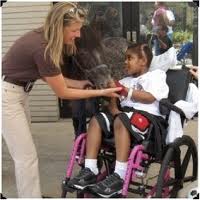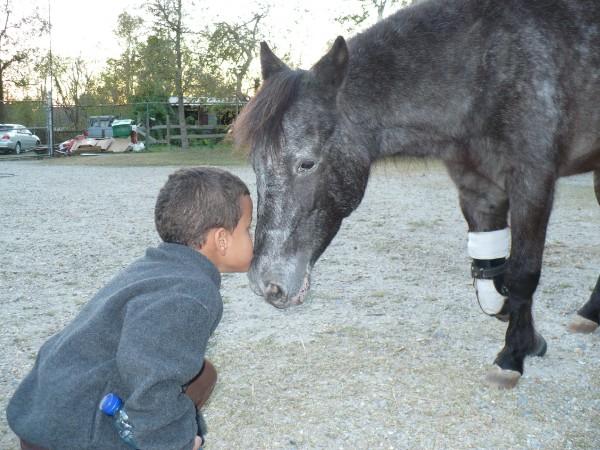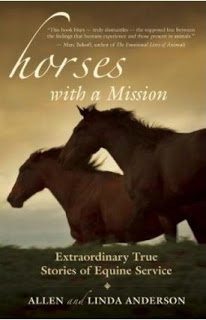Molly was one of the many animals displaced by the wrath of hurricane Katrina in 2005. She was taken in by Kaye Harris, but she suffered an added tragedy when another displaced animal, a pit bull, mauled her on her jaw, abdomen, and legs. The right leg was the worst. She received emergency treatment and most of her injuries healed. But the right leg could not be saved. Kaye Harris’ veterinarian recommended Kaye put Molly down.
But Kaye had watched Molly adapt to the dead leg as she healed from the other wounds. She already knew how to walk, lie down, and get up using three legs. Her tenacity moved Kaye. Like New Orleans, Molly was a survivor. Kaye appealed to the veterinarian to help Molly get a prosthesis for her right leg.
They found help at the Louisiana State University School of Veterinary Medicine. Dr. Rustin Moore was skeptical but was swayed when he met Molly and saw her will to live. Molly came to be one of the few horses to overcome the challenges of amputation and live with a prosthesis.
As Molly recovered and adapted to her prosthesis, it occurred to Kaye that Molly was a Katrina comeback story. She was a bit of good news and inspiration to a region that had suffered much loss. Kaye began taking Molly to hospitals and granted media interviews to tell Molly’s story. Since then, Molly has become an ambassador for amputees and an encouragement to those suffering from disabilities.
Molly is now the mascot for Kids and Ponies Foundation. She travels to encourage others with disabilities and to help others understand disabilities better.
You can read more about Molly and the Kids and Ponies Foundation by visiting http://www.myspace.com/mollythepony.
This amazing little pony is featured in these books:
Photos courtesy Kaye Harris
Nominate a family to be featured in this series!
Do you know a very special family that personifies the word “unstoppable?” Can you think of someone that has taken on the challenge of disability or chronic disease and turned it into a victory dance?
They are all around us, people who live with what others might think of as loss. They are people with incurable conditions, devastating disabilities, or birth defects. Instead of wallowing in self-pity, they have risen above their suffering to live fully. These people and their families have learned how to appreciate the beautiful in the broken. Trials are just bumps in the road for them
They are the everyday heroes.
They are unstoppable.
If you know a family that expresses the spirit of a victor, nominate them to be featured on this site in a future story. Just be sure to get their permission first. Then go to the contact page and send me their names and an e-mail address at which they can be contacted. I will never share their addresses, or yours, with anyone else.






